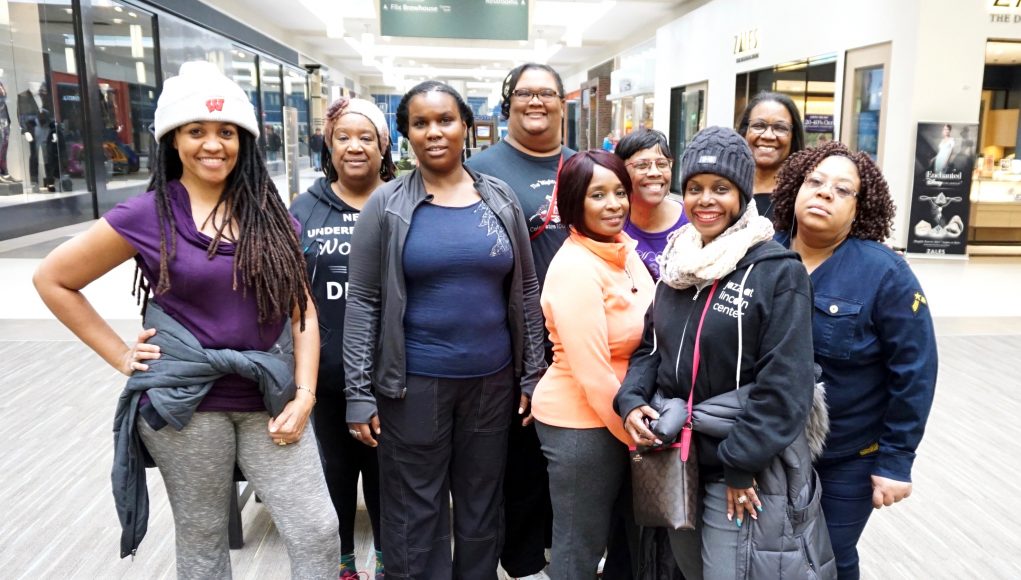“Whatever Lisa says, I do,” said Barbara Boustead, owner of Mary’s Daughter, a Madison-based business that does money management. “This is my second or third time walking with this group.”
That “Lisa” is Lisa Peyton-Caire, organizer of last Sunday’s pop-up walk and the founder of the Foundation for Black Women’s Wellness (FFBWW), the non-profit organization that spearheaded the walk.
With a few days notice, eight women answered Lisa’s call for a “Pop-up Wellness Walk” at East Towne Mall on January 7.
“Normally, we would meet outside, but the weather has been so cold, that we opted for walking indoors,” Peyton-Caire said.
In total, the group logged nearly 3 miles and a cumulative total of 45,000 steps.

The walks started in 2017 as a way to mobilize black women to get moving. Peyton-Caire would like to hold one pop-up event each month and eventually mobilize 50 Wellness Ambassadors to start walking clubs and wellness circles across Madison in 2018.
“With the pop-up walks, we wanted to initiate a simple yet fun way to get women active and moving regularly and to promote physical activity as a lifestyle behavior,” she told Madison365. “This is an essential part of our (FFBWW) health promotion efforts. We know that black women and girls in Dane County are less likely to be physically active than other groups due to work and caregiving obligations, financial restraints in affording gym memberships, or cultural norms that often value work and caregiving over self-care. Walking is a simple and accessible way to get active for anyone, and it costs virtually nothing.”
She added that walking is good for women’s health, especially for preventing heart disease, the number one killer of black women.
“While we’ve done walking and fitness groups seasonally before, we will do them regularly this year and get the ladies and their families out and moving year-round while building strong connections and support systems in the process,” she said.
The social support aspect of group walking is clear as the walkers talked about jobs, family and everyday life before, during and after the walk.
Lolita Phillips is a substance abuse counselor who came for the walking but also because she wants to extend her social networks.
“I need to hang out with more positive women,” she said.
“I’m working on weight loss goals and I’m also here to improve my social life,” said Tamara Washington, also a substance abuse counselor. Washington has also signed up to be a Wellness Ambassador in 2018 and is looking forward to that role.
“I want to start a walking group soon,” she said.

For Peyton-Caire, the work is deeply personal.
She birthed the Foundation for Black Women’s Wellness in July 2012, but the movement started with her first Black Women’s Wellness Day event that she organized on May 22, 2009 in Bowie, Maryland.
“I had just lost my mother three years prior on May 22, 2006, to congestive heart failure. She was 64 and had suffered with escalating health problems from the time of her first heart attack at age 48,” Peyton-Caire remembered. “I didn’t want that to happen to anyone else’s mother, sister or aunt so I started Black Women’s Wellness Day.”
In 10 years, Black Women’s Wellness Day has grown from 40 participants gathered in that small library in Maryland to nearly 600 women who gather annually from across Wisconsin and neighboring states at the Alliant Energy Center.
“Some even travel across the country. We attract national speakers and major sponsor support. It’s a full day event that combines education, resources and bit of entertainment to get women and our partners connected and committed to truly investing in black women’s health far beyond and after the one-day event. The potential to grow is considerable and the demand to put our show on the road and host in other states is growing. We’re proud to celebrate the 10th anniversary this year and to be a catalyst for so many women in transforming their health and their lives,” she said.
Peyton-Caire described a few of the Foundations key events for 2018:
◆ Disrupting Disparities community meeting on Saturday, January 20 with local black women leaders to devise strategies and solutions for radically improving black women’s health and maternal and child health in Dane County and Wisconsin.
◆ 7th Annual Wear Red Day Event and Photo Shoot on Saturday, February 17 where nearly 150 women will gather to join in the fight against heart disease.
◆ SisterCircle Wellness Gatherings start in March and offer education on a range of topics from physical and sexual health, mental wellness, and financial literacy.
◆ 10th Annual Black Women’s Wellness Day on September 22.
◆ Wellness Walks and lots more.

She further outlined key aspects of the Foundation’s work:
“We continue to inspire and support countless women to transform their health and their lives on a daily basis and are truly blessed by the incredible stories and testimonies that are a part of our legacy thus far. We will spend time in 2018 gathering and sharing those stories,” Peyton-Caire says.
“Each year we reach over 1,000 women and girls directly through our health promotion efforts, educational workshops, events, SisterCircles and even more through our social channels where women connect with us for motivation and support,” she continued. “Behind the scenes daily, we help women facing a myriad of challenges in their daily lives to navigate systems and access resources they need like healthcare, housing, counseling, education, financial literacy, and serving as advocates to them.
“Finally, we’ve raised the consciousness of the community and our local health partners and other sectors like never before in understanding more deeply the issue of health disparities and how the lives of black women and our families are uniquely and disproportionately impacted. While supporting women to improve their health, we also advocate for system change as a critical part of the solution to truly stabilize and transform the lives of black women and our families socially and economically. This will ultimately improve our health outcomes and reverse the state of disparity we live in.”
“These efforts will collectively move Wisconsin from the worst for black women’s health and well-being to the best. And that’s our goal,” she added.
For more information, visit the Foundation’s website at www.ffbww.org or Black Women’s Wellness Day at www.blackwomenswellnessday.org.










